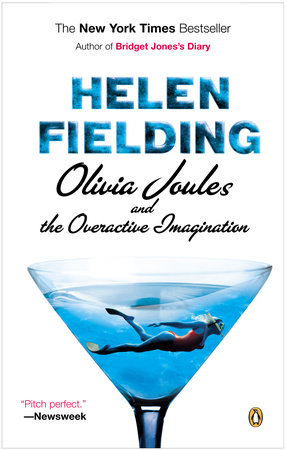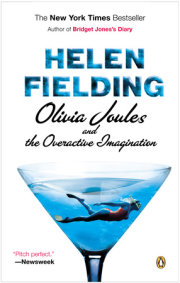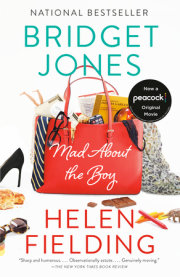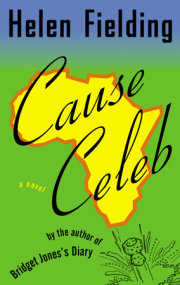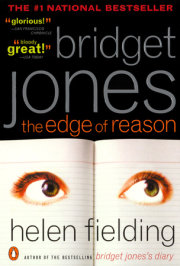1. LondonThe problem with you, Olivia, is that you have an overactive imagination.”
“I don’t,” said Olivia Joules indignantly.
Barry Wilkinson, foreign editor of the Sunday Times, leaned back in his chair, trying to hold in his paunch, staring over his half-moon glasses at the disgruntled little figure before him, and thinking: And you’re too damned cute.
“What about your story about the cloud of giant, fanged locusts pancaking down on Ethiopia, blotting out the sun?” he said.
“It was the Sudan.”
Barry sighed heavily. “We sent you all the way out there and all you came up with was two grasshoppers in a polythene bag.”
“But there was a locust cloud. It was just that it had flown off to Chad. They were supposed to be roosting. Anyway, I got you the story about the animals starving in the zoo.”
“Olivia, it was one warthog—and he looked quite porky to me.”
“Well, I would have got you an interview with the fundamentalist women and a cross amputee if you hadn’t made me come back.”
“The birth of Posh and Becks’s new baby you were sent to cover live for BSkyB?”
“That wasn’t hard news.”
“Thank God.”
“I certainly didn’t imagine anything there.”
“No. But nor did you say anything for the first ten seconds. You stared around like a simpleton, fiddling with your hair live on air, then suddenly yelled, ‘The baby hasn’t been born yet, but it’s all very exciting. Now back to the studio.’”
“That wasn’t my fault. The floor manager didn’t cue me because there was a man trying to get into the shot with ‘I’m a Royal Love Child’ written on his naked paunch.”
Wearily, Barry leafed through the pile of press releases on his desk. “Listen, lovey…;”
Olivia quivered. One of these days she would call him lovey and see how he liked it.
“…;you’re a good writer, you’re very observant and intuitive and, as I say, extremely imaginative, and we feel on the Sunday Times, in a freelancer, those qualities are better suited to the Style section than the news pages.”
“You mean the shallow end rather than the deep end?” “There’s nothing shallow about style, baby.” Olivia laughed. “I can’t believe you just said that.” Barry started laughing as well.
“Look,” he said, fishing out a press release from a cosmetics company, “if you really want to travel, there’s a celebrity launch in Miami next week for some—perfume?—face cream.”
“A face-cream launch,” said Olivia dully
“J.Lo or P. Binny or somebody…;there we go…;Devorée. Who the fuck is Devorée?”
“White rapper slash model slash actress.”
“Fine. If you can get a magazine to split the costs with us, you can go and cover her face cream for Style. How’s that?”
“Okay,” said Olivia doubtfully, “but if I find a proper news story out there, can I cover that as well?”
“Of course you can, sweetheart,” smirked Barry.
2. South Beach, Miami
The lobby of the Delano Hotel was like a designer’s hissy fit on the set of Alice in Wonderland. Everything was too big, too small, the wrong color, or in the wrong place. A light in a ten-foot-high shade hung in front of the reception desk. Muslin curtains sixty feet long fluttered in the breeze beside a wall dotted with miniature wall lamps and a snooker table with beige felt and ecru balls. A dark man was sitting on a white molded chair that looked like a urinal, reading a newspaper. The man looked up as a slender girl with blunt-cut blond hair stepped into the lobby. He lowered his newspaper to watch as she looked around, amusement flickering across her features, then headed for the reception desk. She was wearing jeans and a thin black top, carrying a soft tan-leather tote, and dragging a battered tan and olive carry-on behind her.
“Awesome name,” said the receptionist. “Is that Jewels as in Tiffany?”
“No. J.O.U.L.E.S. As in the unit of kinetic energy,” the girl said.
“No kidding? Ah yes, here we are,” said the receptionist. “I’ll have the bellboy bring in your luggage and send it to your room.”
“Oh, don’t worry. This is all I’ve got.”
The dark man watched as the small, determined figure marched off towards the elevators.
Olivia stared in consternation at the elevator doors, which seemed to be made of quilted stainless steel. As they were closing, a beautiful bellboy in a white T-shirt and shorts forced his arm between them and leapt into the elevator beside her, insisting on helping her take her luggage—despite the lack of it—to her room.
The room was entirely white: white floor, white walls, white sheets, white desk, white armchair and footstool, white telescope pointing at a white venetian blind. The charmingly shaggable, white-clad whippersnapper pulled up the blind, and the startling aquamarines and electric blues of Miami Beach burst into the room like a tiny, vivid oil painting in the center of a thick white frame.
“Yeees. It’s like being in a hospital,” she murmured.
“Rather more comfortable, I hope, ma’am. What brings you to Miami?”
His skin was like an advert for youth, peachlike, glowing, as if it had been force-fed vitamins in a greenhouse.
“Oh, you know, she said, moving closer to the window. She looked down at the lines of umbrellas and loungers against the white sand, the pastel lifeguards’ huts, the surreally blue sea crisscrossed by yachts and Waverunners, a line of big ships following each other along the horizon like ducks in a shooting gallery “My God, what’s that?” One of the ships was three times as big as the others: oddly big, like a pelican in the middle of the ducks.
“That’s the OceansApart,” said the bellboy with proprietary pride, as if he owned not only the ship, but Miami and the ocean too. “It’s like an apartment block—only floating? Are you here on business or pleasure?”
“They built it already?” she said, ignoring the nosy young whippersnapper’s rudely interrogatory manner.
“They sure did.”
“I thought it was still just an artist’s impression.”
“No, ma’am. This is the maiden voyage. It’s going to be anchored in Miami for four days.”
“This is the one on a permanent cruise from Grand Prix to Australian Open to Masters kind of thing, and the people fly in by helicopter to find their Picassos and dental floss laid out waiting?”
“You got it.”
“Sounds like it might make a good story”
“Are you a journalist?”
“Yes,” she said, pride in her quasi foreign-correspondent status overcoming her discretion.
“Wow! Who for?”
“The Sunday Times and Elan International magazine.” She beamed.
“Wow. I’m a writer too. What are you writing about here?”
“Oh, you know. This and that.”
“Well, if you need any help, just give me a call. My name’s Kurt. Anything else I can do for you at all. . ?”
Well... now you come to mention it . . . she felt like saying. Instead, she chastely tipped him five bucks and watched the delightful little white-clad bottom depart.
Olivia joules liked hotels. She liked hotels because:
When you went into a new hotel room, there was no past. It was like drawing a line and starting again.
Hotel life was almost Zen-like in its simplicity: a capsule ward robe, capsule living. No debris, no nasty clothes you never wore but couldn’t throw away, no in-tray, no dishes full of leaky pens and Post-it notes with chewing gum stuck to them.
Hotels were anonymous.
Hotels were beautiful, if you picked right, which, after hours and sometimes days looking at hotel Web sites on the Internet, she inevitably did. They were temples of luxury or rusticity, coziness or design.
The mundanities of life were taken care of and you were freed from domestic slavery hell.
No one could bother you: you simply put DO NOT DISTURB on the door handle and the telephone and the world had to bugger off.
Olivia had not always loved hotels. Most of her family holidays had been taken in a tent. Until the age of twenty-two her only hotel experience had been of dingy yet embarrassingly formal Crowns and Majestics in northern British seaside resorts—strange-smelling, with bizarrely patterned carpets and wallpapers, where the guests spoke in intimidated whispers and forcedly posh accents, and her entire family would freeze with shame if one of them dropped a fork or a sausage on the floor.
The first time she was sent to a hotel on business, she didn’t know what to do or how to behave. But when she found herself in an elegant, untouched room, with a mini-bar, crisp white cotton sheets, room service, high-end soap, no one to answer to and free slippers she felt like she’d come home.
Sometimes she felt bad about liking hotels so much, worried that it made her a spoilt lucky bitch. But it wasn’t just posh hotels she liked. It wasn’t really to do with poshness. Some posh hotels were disgusting: snobbish; overly fancy; not providing the things you needed at all, such as phones that worked, food that arrived hot on the same date as the one on which it was ordered; noisy air conditioning units; views of car parks; and, worst of all, snooty, unfriendly staff. Some of her favorite hotels weren’t expensive at all. The only real criterion of fineness she trusted was whether, on arrival, the toilet paper was folded into a neat point at the end. In the Delano, it was not only neatly pointed, it had a white sticker on saying THE DELANO in cool gray capitals. She wasn’t sure about the sticker. She thought it might be taking things too far.
She put the case on the bed and started lovingly to unpack the contents that would become her home until she was forced back to London. Last thing out of the bag, as always, was her survival tin, which she tucked under the pillow. It wasn’t clever to carry the survival tin through airports, but it had been with her for a long time. It looked like an old tobacco tin. She had bought it in an outdoor adventure shop on the forecourt of Euston station. The lid was mirrored underneath, for signaling. The tin had a handle to transform it into a miniature pan. Inside was an edible candle, a condom for water carrying, cotton wool, potassium permanganate for cleaning wounds and fire lighting, fish hooks, a rabbit snare, a wire saw; water proof matches, a flint, fluorescent tape, razor blades, a button compass and a miniature flare. She hadn’t used any of the items except the condom—which had been several times replaced—and the cotton wool in the occasional hotel that didn’t offer cleansing pads. But she was certain that one day the tin would save her by helping her to collect water in the desert, strangle a hijacker, or signal from a palm—fringed atoll to a passing plane. Until then it was a talisman— like a teddy or a handbag. Olivia had never thought of the world as a particularly safe place.
She turned back to the window and the view of the beach. There was a laminated instruction card hanging from the telescope. She looked confusedly at it for a second, then gave up and peered into the eyepiece, seeing a green blur of magnified grass. She adjusted a dial to reveal the seafront upside down. She carried on, adjusting to the upside-down world moving down—or up? —to a jogger, ugh, without a shirt on (why boastfully revolt others?) and a yacht smacking awkwardly into each wave. She moved on upside-downedly side ways until she came to the OceansApart. It was like the white cliffs of Dover heading for Miami.
She dragged her laptop out of her bag and hanged out an e-mail to Barry
Re: Fantastic new story
1. Miami Cool, going really well.
2. Great Style story: OceansApart—obscenely large new floating apartment block—docked in Miami on maiden voyage.
3. Can cover but would need one or ideally two more nights here? Over and out. Olivia.
She read it, nodding with satisfaction, pressed “Send’ then looked up at the mirror and started. Her hair was quite mad, and her face horrifying in its puffiness: the product of sixteen hours spent in planes and airports—five of them stuck in Heathrow be cause someone had left a laptop in the ladies’ loo. The face-cream party was at six. She had twenty minutes to transform herself into a dazzling creature of the night.
Fifty-eight minutes later she emerged, breathless, from the elevator, scrubbed and polished. A line of white limos stretched from the front of the lobby all the way up the avenue, horns blaring. The hotel bouncers were in their bossiest of elements, throwing their weight around in little white shorts and talking into headsets with the gravitas of FBI agents. Two girls with huge breasts and no hips were posing with rather desperate grins on a red carpet. They looked like weird man-woman hybrids—the upper part buxom female, the lower adolescent boy. They were striking identical poses, standing side-on to the flashbulbs, one leg in front of the other, bodies forced into an S shape, as if they were trying to duplicate a diagram from InStyle magazine or were desperate to go to the loo.
The greeting table displayed a precarious pyramid of tubs of Devorée—Crême de Phylgie, very surgical-looking, plain white with plain green writing. Olivia gave her name, took one of the glossy press packs and headed, reading it, towards the throng, shuddering at the list of repulsive-sounding algae and sea-critter-based ingredients.
A woman in a black trouser suit powered over, arranging her face into the sort of frightening white-toothed smile that looks like that of an angry monkey. “Hi! You’re Olivia? Melissa from Century PR. Welcome. How was your trip over? How was the weather in London?” She marched Olivia towards the terrace, asking inane and ceaseless questions without pause for answer. “How is your hotel room? How’s Sally at Elan? Will you give her my regards?”
They stepped out on the deck where le tout fashionista and musico Miami monde was artfully arranged around a selection of wrong-sized furniture, and spilling down some steps into the garden below, where white-covered comfy chairs, giant indoor table lamps and cabanas surrounded the turquoise-lit pool.
“Have you tried the Devorée martini? You got the press release about the chef who’s prepared the special dishes we’ll be sampling tonight?” Olivia let Melissa’s autowitter wash over her. Usually, she tried to let annoying people do their thing and hoped they’d buzz off as soon as possible. Night had fallen with tropical suddenness. The landscaping was lit with flaming torches, and beyond was the ocean, crashing in the darkness. Or maybe, she thought, it was an air conditioning unit. There was something odd about this party. It felt controlling and tense, like Melissa. The wind was lifting press releases and serviettes, ruffling dresses and hair. There were people around who didn’t fit, moving and watching too anxiously for Party Funland. She focused on a group in the far corner, trying to figure them out. The women were actress/model types: big hair, long legs, small dresses. The men were harder to place: dark-haired, olive-skinned, high mustache quotient. They were making a show of being rich, but they weren’t quite getting it right. They looked like an advert froni Debenham’s in-house magazine.
“If you’ll excuse me, there’s someone I need to bring over. Oh look, there’s Jennifer…;” Melissa powered off, still talking, leaving Olivia standing on her own.
For a throwback second, she felt residual feelings of insecurity. She stamped on them hard, as if they were a beetle or cockroach. Olivia used to hate going to parties. She was too sensitive to the signals given off by other people to glide through any social gathering unscathed. She liked to have proper conversations, not mindless insincere moments, and she could never quite master the art of moving smoothly from group to group. As a result, she used to spend entire evenings feeling either hurt or rude. Dramatic events, however, made her decide she would no longer give a shit about anything. Over time, she had painstakingly erased all womanly urges to question her shape, looks, role in life, or effect upon other people. She would watch, analyze and conform to codes as she ob served them, without allowing them to affect or compromise her own identity.
One of her favorites on her Rules for Living list was “No one is thinking about you. They’re thinking about themselves, just like you.” This was a particularly useful rule at parties. It meant, by implication, that no one was watching you either. Therefore, you could just stand on your own and observe, and no one would think you were a sad act. No one, for example, was thinking now that she was Olivia-no-mates-Joules just because she was on her own. Or worse, Rachel-no-mates-Pixley. No one would say, “Rachel Pixley, you’re a dropout from Worksop Comprehensive. Leave the Delano Hotel this instant and go to the Post House Hotel on the Nottingham bypass.”
When Rachel Pixley was a normal schoolgirl, living with two parents in Worksop, coming home to tea in a warm house, she used to think that an orphan was a glamorous thing to be, like Alona the Wild One in Bunty or Mandy comics——an orphan who was wild and free and galloped her horse bareback along the shoreline. For a long time after it all happened, she thought she had been punished for this fantasy.
When Rachel was fourteen, her mother, father and brother were run over by a lorry on a zebra crossing. Rachel, having lagged behind buying sweets and a magazine, saw the whole thing. She was put in the care of her unmarried Auntie Monica, who had cats and read newspapers all day in her nightdress. Her flat smelt of something indefinable and bad, but despite the fag ash that festooned her like snow, and her eccentric and inaccurate application of lipstick, Auntie Monica was beautiful and had been brilliant. She had studied at Cambridge and still played the piano wonderfully—when she wasn’t drunk. Playing the piano when drunk, as Rachel came to realize during the time she spent chez Auntie Monica, was like driving when drunk—inadvisable, if not criminal.
Rachel had had a boyfriend at school who was a couple of years above her but seemed much older than everyone else. His father was a nightwatchman and a maniac. Roxby was not exactly good looking, but he was his own man. He used to work nights as a bouncer in Romeo and Juliet’s. And when he came home—because by this time he and Rachel were living together in a room above the Hao Wah Chinese takeaway—he used to sit at the computer investing his bouncer earnings in stocks and shares.
Rachel, who had only ever understood money as something you earned in very small quantities by working, was initially resistant to the notion of making money out of money. “Money doesn’t buy happiness,” her hardworking father had told her. “If you work hard and you’re honest and kind, then nothing can harm you.” But it had. A lorry had run over him. So Rachel threw in her lot with Roxby and worked every weekend at Morrisons’ supermarket, and did evening shifts after school in a corner shop run by a Pakistani family, and let him invest the money for her. When she turned sixteen, her father’s life insurance policy was turned over to her. She had twenty thousand pounds to invest. It was the beginning of the eighties. She was on the way to becoming, if not a rich woman, at least a woman of independent means.
When she was seventeen, Roxby announced that he was gay and moved to the canal district of Manchester. And Rachel, fed up with knock after knock, took a long hard look at life. She had seen her friends’ older sisters, radiant and triumphant, flashing minuscule H. Samuel’s solitaires on their engagement fingers, spending months obsessed with dresses, flowers and event planning, only to be found a couple of years later in the shopping center, fat, broke and hassled, pushing prams through the rain, moaning about being hit, or belittled, or left. And she thought: Sod that. She started with her name. “Olivia” sounded glam. And the attractiveness of the word “Joules” was the only thing she remembered from physics lessons. I’m all I’ve got, she thought. I’m going to be complete in myself. I’m going to work out my own good and bad. I’m going to be a top journalist or an explorer and do something that matters. I’m going to search this shitty world for some beauty and excitement and I’m going to have a bloody good time.
And this Olivia Joules thought, leaning back against the Delano pillar, is a lot more beautiful and exciting than Worksop. No one is watching you, just go with the flow and enjoy it. Unfortunately for the Rule for Living, however, somebody was watching her. As she continued to scan the party, a pair of eyes met hers in a second of highly charged interest, then looked away She also looked away, then glanced back. The man was standing alone. He was dark and rather aristocratic-looking. He was wearing a suit that was a bit too black and a shirt that was a bit too white—too flash for the Delano. And yet he didn’t look like a flash person. There was a stillness about him. He turned, and suddenly his eyes met hers again with that thrilling unspoken message which sometimes transmits itself across a room and says, “I want to fuck you too.” That was all that was needed: a look. No need to flirt, to maneuver, to chat. Just that moment of recognition. Then all you had to do was follow, like in a dance.
“Everything going okay?” It was the hyperactive PR woman. Olivia, realizing she was staring lustfully into space, remembered that she had a piece to file by tomorrow and had better get on with it. “There’s lots of people I want you to meet,” said Melissa, starting to bustle Olivia along. “Have you had something to eat? Let me see if we’ve got some people for you to talk to. Have you met Devorée?”
Putting thoughts of shagging strangers firmly to one side, she turned her attention to the business of quote-gathering. Everyone wanted to be in British Elan and the launch was easy pickings for sound bites. After an hour or so she had vaguely face-cream-based quotes from Devorée, Chris Blackwell, the manager of the Delano, a couple of handsome men whom she suspected were for hire, the guy who did the list at Tantra, the PR for Michael Kors and P Diddy. It was more than enough for the solitary paragraph which would inevitably prove the sum total of Elan’s coverage. Moving on to the Sunday Times “Cool Miami” piece, she quickly filled her notebook with the grandmother of one of the models, who had lived on the South Shore Strip twenty years before it became fashionable again; a cop who claimed to have been on the scene after the Versace shooting and was plainly lying and——la pièce de résistance—Gianni Versace’s former cleaning lady.
“Olivia?” Damn, it was Melissa again. “Can I introduce you to the creator of Devorée’s Crème de Phylgie? Though, of course, Devorée has selected the ingredients personally herself.”
Olivia let out an odd noise. It was the man who had been watching her. He was a compelling mixture of soulful and powerful: finely drawn features, a straight nose, fine, arched brows, hooded brown eyes.
“This is Pierre Ferramo.” She was disappointed. The name sounded like something you’d find in gilt-plastic faux handwriting, pinned on an overpriced tie in a duty-free shop.
“Ms. Joules.” He was wearing a ridiculously over-the-top gold watch, but his hand was rougher than she expected and the hand shake strong.
“Pleased to meet you,” she said. “Congratulations on Crème de Phylgie. Does it really contain sea slugs?”
He didn’t laugh, he glinted. “Not the sea slugs themselves, only an essence: an oil secreted by their skin.”
“It sounds like something you’d want to wipe off rather than put on.”
“Does it, indeed?” He raised his eyebrows.
“I hope you won’t be writing that in your piece,” trilled Melissa with a brittle laugh.
“I’m sure Ms. Joules will write with infinite subtlety and grace.”
“Infinite,” she said.
There was an extremely charged pause. Melissa looked from one to the other then started twittering. “Oh look, she’s leaving. Will you excuse us? Pierre, I just want you to say hello to one of our very special guests before she leaves.”
“Very well,” he said wearily, murmuring to Olivia as he left, “sea slugs indeed.”
Melissa introduced Olivia to more of her client base: two members of a boy band called Break whose gimmick was surfing and who had a “Beach Boys meets Radiohead fusion vibe.” Olivia had never heard of the band, but the two boys were rather sweet. Beneath the surf-white hair, their complexions displayed a fascinating mixture of sunburnt crispiness and acne. She listened as they chattered on about their careers, Beavis-and-Butthead-type nervous sniggers punctuating a fragile veneer of bored arrogance. “We’re auditioning for parts in this, like, movie? With surfers?” Their strange interrogatory intonation seemed to suggest that someone as old as Olivia might not understand words like “movie” or “surfers.” “It’s going to launch the single off the album?”
Two hits and they’d be off, but they didn’t know it. She felt like giving them a motherly chat, but instead she just listened and nodded, watching Pierre Ferramo out of the corner of her eye.
“That’s the guy who’s, like, the producer? Of the movie?” whispered one of the boys. “Really?”
They all watched as Ferramo made his stately way towards a mysterious-looking group of dark men and models. He moved gracefully, languid almost to the point of being fey, but exuding a sense of tremendous latent power. He reminded her of someone. The group parted like the Red Sea to receive him, as if he were a guru or god rather than a face cream creator slash producer slash whatever. He settled himself down gracefully, crossing one leg over the other, revealing an expanse of bare leg, black shiny slip-ons and thin silky gray socks. A couple close to the group rose to leave their sofa.
“Shall we sit a bit nearer?” said Olivia, nodding towards the empty seats.
It was a silly, too-big sofa, so Olivia and the surf boys had almost to climb onto it, and then either virtually lie down or sit with their legs dangling like children. Ferramo looked up as she sat and graciously inclined his head. She felt her senses quicken and looked away. She breathed slowly, remembering her scuba-diving training: just keep breathing, deep breaths, be cool at all times.
She turned back to the boys, crossing her legs and smoothing her hand across her thigh. She moistened her lips, laughed and played for a second with the delicate diamond and sapphire cross at her throat. She could feel his eyes on her. She raised her lashes, preparing to look straight into those penetrating dark eyes. Oh. Pierre Ferramo was staring down the cleavage of the tall, unbelievably beautiful Indian model on his other side. He said something to her and the two of them rose, his arm around her, his hand on her hip, guiding her away from the table. Olivia looked at one of the spotty boys. He leaned forward and whispered, “It was doing it for me,” and traced a tiny circle with his finger on her thigh. She laughed her deep throaty laugh and closed her eyes. It had been a while.
Halfway across the terrace, Pierre Ferramo heard Olivia’s laugh and raised his head, like an animal catching a scent. He turned to Melissa, who was hovering at his elbow and murmured a few words to her, then he continued his dignified progress towards the lobby, the tall, silken-haired Indian model at his side.
As she sipped her apple martini, Olivia was struggling to think who it was that Ferramo reminded her of: the hooded eyes, the sense of intelligence and power, the languid movements.
She felt a hand on her arm and jumped.
“Olivia?” It was the wretched Melissa. “Mr. Ferramo would like you to join him for a small private party he is having in his apartment tomorrow night.”
Olivia could hardly breathe. The small hairs were rising on the back of her neck and her forearms.
“All right,” she said, brave and resolute, eyes darting this way and that in terror. “I shall be there.”
Melissa looked at her oddly. “It’s only a party”
But Olivia had suddenly realized exactly who Ferramo reminded her of. It was Osama bin Laden.
Copyright © 2005 by Helen Fielding. All rights reserved. No part of this excerpt may be reproduced or reprinted without permission in writing from the publisher.

